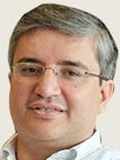Prof. Mohamed-Slim Alouini
|
 |
Date and Time: June 6th 2017, 9 AM at D-Block
Title: Paving the Way Towards 5G Wireless Communication Networks
Abstract: 5G wireless communication networks are expected to fulfill the demand for higher data rates, lower latency, and/or massive connectivity of a growing number of users/devices exploiting a variety of wireless applications. This envisioned rapid increase in the use of wireless services lead the wireless research community to start looking at new technologies to address problems related to the radio-frequency (RF) spectrum exhaustion. This includes the development of (i) new techniques and concepts such as massive multiple input multiple output (MIMO) systems and heterogeneous networks to improve the spectral efficiency at the link and network layers, respectively, and (ii) novel schemes to better utilize the unregulated bandwidth in particular in the upper millimeter wave, THz, and optical portion of the spectrum. This talk will first go briefly over the vision and goals of 5G wireless communication networks. Then it presents some of these emerging enabling technologies that need to be developed to pave the way towards the successful roll-out and operation of these future wireless networks. Finally, the talk offers at the end an overview of some of the recent results in the areas of massive MIMO systems, full-duplex communication systems, and optical (Li-Fi) wireless communication systems.
Bio: Mohamed-Slim Alouini (S’94, M’98, SM’03, F’09) was born in Tunis, Tunisia. He received the Ph.D. degree in Electrical Engineering from the California Institute of Technology (Caltech), Pasadena, CA, USA, in 1998. He served as a faculty member in the University of Minnesota, Minneapolis, MN, USA, then in the Texas A&M University at Qatar, Education City, Doha, Qatar before joining King Abdullah University of Science and Technology (KAUST), Thuwal, Makkah Province, Saudi Arabia as a Professor of Electrical Engineering in 2009.
Prof. Alouini is a Fellow of the Institute of Electrical and Electronics Engineers (IEEE), a member of the Thomson ISI Web of Knowledge list of Highly Cited Researchers and of the Elsevier/Shanghai Ranking list of Most Cited Researchers, and an IEEE Distinguished Lecturer of the IEEE Communications Society. He is a recipient of the Recognition Award of the IEEE ComSoc Wireless Technical Committee in 2016 and a co-recipient of best paper awards in ten IEEE conferences (including ICC, GLOBECOM, VTC, PIMRC, and DySPAN). His current research interests include the modeling, design, and performance analysis of wireless communication systems.
Prof. Thomas MagedanzTechnishe Universität Berlin |
 |
Date and Time: June 6th 2017, 1 PM at D-Block
Title: Getting ready for 5G and Edge Computing – Understanding the Role of ETSI MANO and OpenBaton
Abstract: Future network infrastructures have to be highly flexible and efficient in order to enable agile and innovative business models. Thus software-based networks exploit network function virtualisation (NFV) and Software-defined networking (SDN) principles are emerging, in which virtualized network (and application) functions can be dynamically orchestrated and managed, i.e. deployed, moved, scalled up & down, and removed as needed. The emerging fifth generation of mobile networks (5G) is considered as a catalyst for the implementation of such a flexible softwarized network, in which the notion of the network edge becomes of key importance in order to meet specific 5G application requirements in regard to low latency, security, data processing and bandwidth optimization. This talk will describe the the state of play in 5G, multi-access edge computing (MEC) and FOG standardization and will highlight the importance of the ETSI Management and Orchestration (MANO) standardization in all of these activities. Based on this ground, this presentation will introduce the MANO Open Source reference implementation OpenBaton (www.openbaton.org), which is used around the globe in various 5G/NFV/SDN testbeds, such as the FOKUS 5G Playground and the IOT Lab. Examples will be shown how OpenBaton can dynamically create network slices which take into account MEC and FOG nodes, depending on different application needs.
Bio: Thomas Magedanz (PhD) is full professor in the electrical engineering and computer sciences faculty at the Technische Universität Berlin, Germany, leading the chair for next generation networks (www.av.tu-berlin.de) since 2004. In addition, he is director of the software-based networks competence center at the Fraunhofer Institute FOKUS (www.fokus.fraunhofer.de/go/ngni) in Berlin since 2003. Since 25 years Prof. Magedanz is working in the convergence field of fixed and mobile telecommunications, the internet and information technologies, which resulted in many international R&D and consultancy projects centered around the softwarization of networks and namely the prototyping of advanced Service Delivery and Control Platforms for converging fixed and mobile Next Generation Networks for major international network operators and equipment manufacturers. In the course of his research activities he published more than 300 technical papers/articles and his OpenXXX software toolkits and the build upon advanced mobile broadband network testbeds for 3G 4G and 5G prototyping are used in many pioneering R&D and innovation labs around the globe. The newest 5G-ready toolkits from his team are centered around 5G, SDN/NFV/MANO, MEC/FOG, M2M/IOT technologies and collectively form the new 5G Playground (www.5G-playground.org) which has been established in 2015. The Open 5G Playground has been extended in 2016 towards the 5G Berlin Testbed (www.5GBerlin.de), which enables Berlin to become the German 5G capital. In addition, Prof. Magedanz is optimizing 5G-ready technologies for Industrial Internet of Things applications and infrastructures and contributes to the Berlin Center for Digital Transfomation (www.digitale-vernetzung.org). For more details and a longer version look here: http://www.av.tu-berlin.de/menue/team/prof_dr_thomas_magedanz/
Prof. Erdal ArıkanBilkent University |
 |
Date and Time: June 7th 2017, 9 AM at D-Block
Title: Polar Coding for 5G
Abstract: We will review the current state of standardization in 5G as it relates to forward error correcting codes. Requirements will be reviewed and an assessment of state-of-the-art methods will be given with emphasis on polar coding. The talk will include a brief overview of polar coding.
Bio: Erdal Arıkan works as a Professor at the Electrical-Electronics Engineering Department of Bilkent University, Ankara, Turkey. He received his PhD degree from M.I.T. in 1986. He is best known for his work on polar coding for which he received the 2010 IEEE Information Theory Society Paper Award and the 2013 IEEE W.R.G. Baker Award. He is a Fellow of the IEEE and a member of Science Academy, Turkey.


